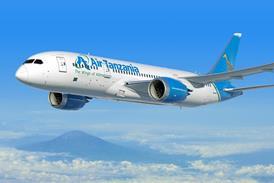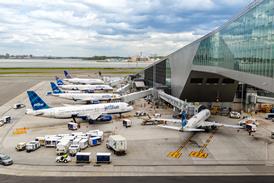In 2019 when more than a dozen business jets touched down at EBACE in Geneva fuelled by sustainable aviation fuel (SAF), it seemed to herald a new dawn as a sector under a lot of pressure for its impact on the environment looked to fulfil a pledge to clean up its act.
Six years on and most of the challenges flagged at the time around embracing SAF – notably relating to cost, availability and a lack of sufficient policy support – remain issues.
And for those flying within, to or from Europe, they now face the additional impetus of meeting mandates around the uplift of SAF.
Under mandates in the European Union and the UK respectively, from this year 2% of all fuel uplifted at European and UK airports must be SAF. Both schemes progressively ramp up the share of SAF required, initially to 6% in the EU and 10% in the UK by 2030, and then steeply upwards towards 2050.
Both mandates also include requirements for a portion of this SAF to be synthetic or power-to-liquid fuels, starting in the UK from 2028 and from 2030 in the EU. It is the eSAF component which is raising most concerns given the dearth of production of non HEFA-based (hydroprocessed esters and fatty acids) SAF today.

That was underlined by European aviation regulator EASA in an update on progress to meeting SAF mandate targets. EASA’s production capacity assessment for the EU judged that announced SAF capacity is expected to meet the minimum SAF share required by 2030.
However, it flagged that “rapid action” is needed to meet the synthetic aviation fuel minimum share requirements, noting final investment decisions are required on synthetic fuel facilities in the next couple of years to hit the 2030 target.
But new SAF facilities have come on track. In April, green fuels specialist Neste began producing SAF at its renewable-products refinery in Rotterdam. The refinery has been modified to enable Neste to produce up to 500,000t of SAF annually, increasing the company’s global SAF production capability to 1.5 million tons per annum.
“Line number one is complete, and we are now ready to supply EU-based production of SAF for our customers out of Rotterdam,” said Neste chief executive Heikki Malinen during a first-quarter results call. “Then the big thing at Neste is the new huge investment in Rotterdam to build a second line.”
However, other developments are lagging. Shell for example last summer paused construction work at its 820,000t a year biofuels facility in Rotterdam “to address project delivery and ensure future competitiveness given current market conditions”. Meanwhile, in April, BP was reported to have paused plans to produce SAF at is Castellon refinery in Spain.
While BP is re-emphasising growth of its oil and gas business under a strategic reset since new chief executive Murray Auchincloss took the helm, Air BP chief executive and senior vice-president, global aviation for BP, Fede Berra, says this strategy will still enable it to invest in its low-carbon businesses.
“There is enough supply for current [SAF] mandates but looking forward we are making a commitment to biofuels and buying in the market to supply our customers,” she says, noting that it is working on three HEFA SAF projects. A final investment decision to progress one is due in 2027.
“Supply is enough for medium-term needs but from the 2030s we will need more production coming on line and alternative feedstocks. There is only so much cooking oil in the world,” she says, noting Air BP is evaluating clover crops which offer the same or reduced carbon intensity as cooking oils with limited impact on land use if planted between food crops.
Berra though highlights concern around there being enough eSAF production in place to meet that part of the mandates as “the current risk versus reward is not balanced”. She adds: “Another challenge is that the price of eSAF will be five to eight times that of jet fuel.”
Meanwhile, BP has just successfully led a taskforce to achieve approval from the UK Ministry of Defence for co-processing SAF with up to 30% renewable HEFA, up from the current limit of 5%. “Co-processing produces high-quality fuel that meets stringent aviation standards, while helping to increase the volume of SAF available to customers,” says Berra.
Daniel Coetzer, chief executive of the international business of US-based Titan Aviation Fuels, points to the expectations placed on oil companies to lead the renewable transition, without clarity on the details of how the SAF can be sustainably produced.
“I think for the past few years there has been quite a lot of unfair pressure on oil companies to come up with the solution and I think now people start to realise that it is not that easy,” he says. “It is going to come, but let’s find a logical solution.”
Coetzer notes that the scale of commitments means airlines will be first in the queue when it comes to securing SAF, rather than the smaller passenger numbers the cost of SAF must be spread across for business aviation.
“In the business aviation sector, we’ve seen a lot of operators who really like to use SAF. But it’s just very expensive,” he says.

“We have the product available from our suppliers,” Coetzer adds. “We are really trying to market it and assist our customers; both to enable the ones who want the product to have it, and the ones who don’t have the product or don’t understand the product’s viability yet, to work with them to explain it is a good product, it is viable.”
But he notes that even business aviation operators that are outside the mandate’s scope – operating fewer than 500 flights a year – can end up paying for SAF if they fuel from an airport that is providing a SAF blend because it is already mixed in the fuel.
He says Titan is working with out-of-scope operators to find airports that can provide regular Jet-A fuel but adds: “I think there must be something in place so if you are charged and you are not meant to be charged, that you are exempt from it. There must be a way you can claim this back from the EU, but that is not there yet.”
In February the European Business Aviation Association (EBAA) joined a host of other European aviation bodies to press the case for the adoption of a book-and-claim system to help accelerate the deployment of SAF across Europe.
A book-and-claim system – a mechanism under which SAF purchases and usages could be accounted for without requiring physical delivery at an airport – would, they say, ensure a more efficient SAF market without being restricted to physical supply at mandated airports, while also helping aircraft operators to comply with the mandates without incurring additional costs.
“This system can be introduced without any additional cost to the EU or the member states, while it would enable better distribution of and access to SAF at competitive prices, which in
turn would help to stimulate and deploy production across Europe,” the industry bodies said in a February letter to the European Commission.
EBAA has long been calling for a book-and-claim system, flagging it as a crucial requirement in early 2024 when, together with the General Aviation Manufacturers Association (GAMA), it set out recommendations for the sector to exceed mandated requirements of uplifted SAF.
That sought to create a framework to support European business aircraft operators to reach 20% SAF uptake levels – either directly uplifted or through a ‘robust’ book-and-claim systemby 2030 – and ultimately to be using 100% SAF by 2050.
The associations identified a number of European airports it was working with to facilitate rovision of SAF. One of those, Farnborough Airport in the UK, is seeking to establish a leadership position – having sold more than two million litres of SAF since making it available for all customers in July 2021.
“Today we are one of the largest single-site SAF suppliers to the business aviation community,” says Farnborough Airport chief executive Simon Geere. “We have ambitions to be the first UK airport to transition away from traditional jet fuel entirely and to do so by the end of the decade.”

It took a further step towards that aspiration in March when it struck a deal with Hydrogen Refinery for 12.5 million litres, or 10,000t, per annum of SAF produced locally from waste.
“It has the potential to provide us with enough proprietary supplies of SAF for us to become the first and only airport in the world to be offering fuel with a 20% blend across its entire supply by 2028,” says Geere.
Despite supply challenges, Geere sees SAF as an opportunity for business aviation. “This is because typically it is a market which has the capability to sustain the higher upfront costs necessary to support the transition to new fuel technologies,” he says. “We see ourselves at the forefront of this opportunity to advance the technology due to the significant economic value of the flights we support and the smaller and modern aircraft we handle.”
Elsewhere, Patrick Gallagher, president of fractional aircraft ownership giant NetJets, flagged its continued investment in sustainable fuel. “We roughly doubled the amount of SAF we purchased in 2024 compared to the prior year and nobody in the industry buys more SAF than we do,” he said in a social media post earlier this year.
Other recent developments include Jet Aviation, which has provided SAF in Geneva at recent EBACE shows, in January offering SAF at its completions and maintenance facility in Basel – the firm’s 12th location for such a service.
Meanwhile, in March, private aviation terminals operator Signature Aviation announced it was adding the provision of SAF to six more locations in Europe: the London airports of Gatwick, Heathrow and Luton, as well as East Midlands and Manchester airports in the UK and Paris Le Bourget. It takes to 33 the number of locations where Signature is offering SAF.
It also has plans to add SAF provision to further fixed-base operations in Europe, the Middle East and Africa this year, as well as unveiling its first fully electric refueling vehicle in the region at Nice Cote d’Azur airport.


























